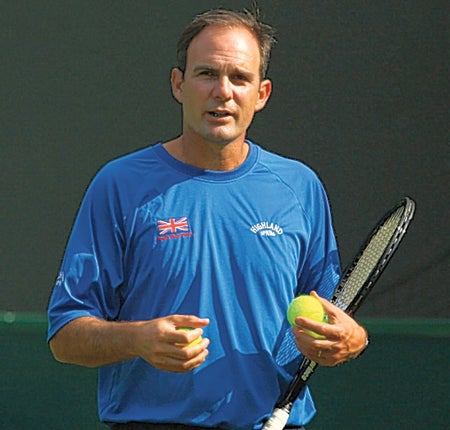Annacone content in Federer camp despite British attachment
Coach denies conflict of interests in New York but is 'disappointed' with results during LTA spell

Picture the scene here at the US Open in nine days' time. Andy Murray, playing in his third final at a Grand Slam event, is taking on Roger Federer, the man who has denied him on both previous occasions.
Among the Lawn Tennis Association employees in the crowd is Britain's head coach of men's tennis. Unlike his colleagues, however, he is not cheering Murray's every winner. Indeed, he has been telling Federer how to stop the Scot becoming the first male British winner of a Grand Slam singles title since Fred Perry won the US Open here 74 years ago.
It was last week, just before the start of this year's tournament, that Paul Annacone joined Federer's entourage on a long-term basis following a one-month trial. Annacone, who used to coach Pete Sampras and Tim Henman, has been with the LTA since 2006, working 30 weeks a year, but announced in May that he would not seek to renew his contract when it expires in November.
On the face of it there could be a major conflict of interests if Murray and Federer meet in the final – both men still had five matches to get there as the former world No 1 prepared to meet Andreas Beck last night – but neither Annacone nor Leon Smith, the LTA's head of men's tennis, sees it that way.
Annacone said he had come here with a clear understanding that he would work in the week before the tournament with the British players attempting to qualify, but that for the next fortnight he would be with Federer. "These two weeks are Roger weeks," he said.
The American said he would be "ecstatic" to see Federer and Murray meet in the final. He agreed that his own involvement might be perceived as a conflict but insisted: "If you look at what my agreement says and what the situation is with my employment and my role at the LTA, it isn't."
While Annacone said he was "very flattered" to work with Federer, he is clearly not fazed by the task of switching from players like Alex Bogdanovic and Jamie Baker, who mustered one qualifying win between them last week, to a 16-times Grand Slam champion.
Annacone admitted that he was "disappointed" to be leaving British tennis in its present state at elite level. When he joined the LTA, Murray, Tim Henman and Greg Rusedski were all in the world's top 100, with Bogdanovic not far behind, and the Davis Cup team were playing in Europe Africa Zone Group One. Today Bogdanovic, the highest-ranked Briton after Murray, is the world No 216, while the Davis Cup team have just avoided relegation to Group Three, the competition's lowest tier.
However, Annacone said that the changes of which he had been a part would take at least 10 years to bear fruit. He also pointed out that competition was now so fierce that male players are taking longer to mature. Recently there have been no teenagers in the world's top 100.
Annacone said that Britain's pool of talent was not deep enough, but he was encouraged by the fact that at junior levels the number of good players was growing. "I'm actually pretty happy with the player development structure that's been put in place," he said. "We need more players playing. I think that's getting better, but it needs to get better still."
The American rejected the suggestion that the LTA should give up trying to develop talent and should instead concentrate on supporting British players involved in other coaching programmes. He said that too many British players thought they were entitled to financial support.
"The players, for some reason which I still haven't quite grasped, think for some reason that the LTA or whoever – Nike or adidas or somebody – should be giving them the money so that they can make it," Annacone said. "I think it's up to the players to find a way to get better. My parents were schoolteachers and they borrowed money when I was a kid to send me to [Nick] Bollettieri's. When I turned pro I borrowed money and I knew if I didn't make it I was going to have to go back. Luckily I made it. My point is, my goal never changed. I was always trying to get better, to improve, however I had to do it."
Subscribe to Independent Premium to bookmark this article
Want to bookmark your favourite articles and stories to read or reference later? Start your Independent Premium subscription today.

Join our commenting forum
Join thought-provoking conversations, follow other Independent readers and see their replies
Comments